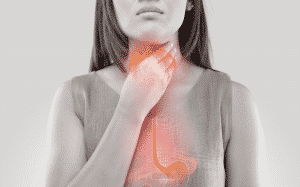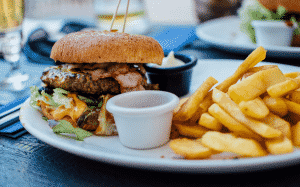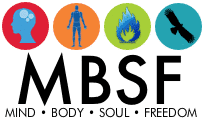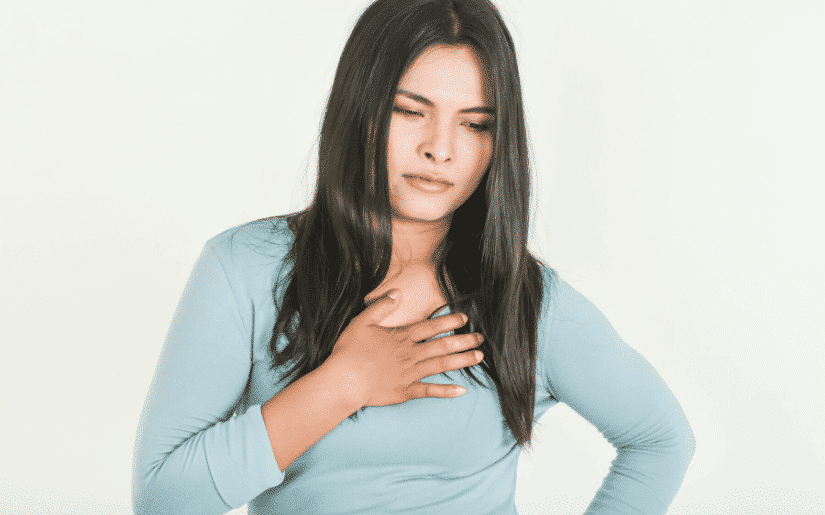Although some people experience heartburn when hungry, most people feel the dreaded burning sensation after eating a large meal. Spicy foods and fried foods can trigger heartburn and have you reaching for the antacids right away.
It’s also quite common for symptoms to strike while you’re sleeping. Unfortunately, heartburn can also become an issue during pregnancy, or if you are overweight.
Chronic heartburn could be a symptom of something more serious, such as GERD, acid reflux, or even a heart attack. Figuring out what’s causing your heartburn in the first place is the first step to getting it under control.
Here are the most common symptoms and causes of heartburn, plus what you can do to get relief.
Can you get heartburn when hungry? What causes heartburn?
Heartburn is a burning, painful sensation that occurs in the chest when stomach acid backs up into the esophagus. The sensation is usually felt in the center of the chest, right behind the breast bone. It’s often worse when you lay flat or on your right side.
Over the counter (OTC) antacids like Tums, Zantac, and Pepcid can bring fast relief in many cases. There are also some home remedies and lifestyle changes that can be very helpful. People who experience heartburn only occasionally don’t usually need to see their doctor.
However, if your symptoms become frequent or severe, you should see a gastroenterologist. Anyone who experiences shortness of breath, pain going down the neck and arms, along with severe heartburn should seek emergency medical attention because they may be having a heart attack.
Yes, you can get heartburn when hungry, and hunger pangs can make the heartburn sensation more intense. Some types of heartburn, such as dyspepsia, can also mimic hunger pains. GERD and acid reflux are more common after eating certain foods or after a heavy meal.
Whether you get heartburn when hungry or after eating, knowing which type of heartburn you are experiencing can be helpful when seeking treatment.
-
Acid Reflux
Acid reflux is a chronic condition that is characterized by severe heartburn, stomach pain, a burning sensation in the upper abdomen, and regurgitation of liquid that tastes of acid into the throat. People with acid reflux may also experience a persistent sore throat, hoarseness, and a chronic cough.
-
GERD (Gastroesophageal Reflux Disease)
GERD is a chronic and more serious form of reflux. Heartburn is the main symptom. Symptoms of GERD can include a burning sensation in the chest, coughing, wheezing, belching, or a bitter taste in the mouth.
-
Dyspepsia
Dyspepsia is another type of heartburn, that we often refer to as a sour stomach. Symptoms of dyspepsia often include nausea and an upset stomach. If you often have heartburn when hungry, you could be experiencing Dyspepsia. It’s easy to mistake this type of heartburn for hunger because it can make you feel slightly shaky or weak, along with slight nausea. The symptoms often go away when you eat because eating stimulates the stomach to empty itself.

How Heartburn Occurs
The tube that connects your mouth to your stomach, called the esophagus, has a tight band of muscles at its lower end. It’s called the lower esophageal sphincter (LES). The LES closes when food passes through it into the stomach, which prevents stomach acid and food from reentering the esophagus.
If the LES is weak or relaxes at the wrong time, it allows food and stomach to come up into your esophagus, which leads to heartburn and other symptoms.
Common Foods and Beverages That Trigger Heartburn

Although it is possible to experience heartburn when hungry, it is more likely to occur after you eat. Many foods that cause heartburn and indigestion for some people have no effect on others. To get to the bottom of what’s causing your heartburn, try keeping track of what you ate right before symptoms occurred in a food journal. You might also want to note which foods seem to relieve your symptoms. Over time, you’ll be able to notice trends so you can adjust your diet accordingly.
Here are the most common foods that trigger heartburn symptoms for most people:
- Alcohol can cause the LES to relax, which triggers heartburn.
- The acid in coffee, orange juice, and other acidic beverages may trigger heartburn.
- Spicy, fried, and fatty foods are common heartburn triggers.
- Acidic foods like oranges and tomatoes may trigger symptoms.
Lifestyle Changes to Relieve Heartburn When Hungry or After Eating

The best place to start is to avoid doing the things that trigger your symptoms. There are many lifestyle changes you can make that can help to relieve your symptoms.
- Heartburn can occur when you’re hungry or it can be triggered by overeating. Changing your eating habits can be very helpful. Eat before you get hungry and avoid eating large meals that can lead to bloating and pressure on the LES. Aim for three smaller meals and three snacks throughout the day to prevent hunger without becoming too full.
- Eating more slowly may also help. Try taking smaller bites, chewing carefully, and pausing between bites.
- Going to bed with a full stomach can cause acid reflux. Wait at least two hours after eating before laying down, and don’t eat a large meal before bedtime. Late-night snacks could also cause reflux, so you’ll want to avoid those as well.
- Laying flat can worsen or trigger your symptoms. Try sleeping with your head higher than your stomach by using a wedge-shaped pillow or elevating the head of your bed.
- Eating a light snack before bed to prevent heartburn when hungry during the night.
- Smoking can worsen your symptoms by relaxing the LES. It also damages the esophagus, making it more susceptible to additional damage from acid reflux.
- Alcohol increases stomach acid production and worsens that horrible burning sensation, so you’ll definitely want to cut back or stop consuming it completely.
- Avoid wearing clothes that are tight around the stomach.
- If you are overweight, your stomach may be putting upward pressure on your LES. Make changes to your diet and lifestyle to lose weight and get lasting relief.
Wrap-Up
If you experience heartburn when hungry, after you eat a big meal, or when you eat certain foods, there are many things you can do to get relief. Over-the-counter antacids can provide immediate relief and making certain diet and lifestyle changes offer a long term solution. However, if you can’t get relief on your own, it’s a good idea to see your doctor, give him your health information, and possibly get prescription proton pump inhibitors (PPIs) to avoid doing permanent damage to your esophagus and digestive system.

